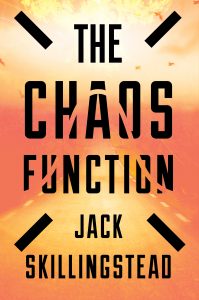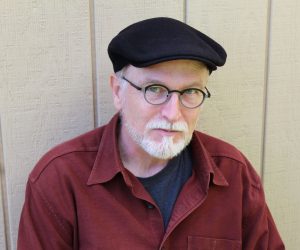Jack Skillingstead Guest Post–“Crisis Points”
Your life, whether you know it or not, has been shaped by crisis points. They come in all shapes and sizes, from personal life decisions—whether to divorce, who you choose to trust in a dangerous situation, what seat you pick when you purchase tickets on a flight you didn’t know would crash—to geopolitical events with staggering consequences. You can also think of crisis points as pivot points, a moment or event that exerts a pivotal influence on the future. I began seriously thinking about these things a couple of years ago when I read a piece in The New Yorker about Alan Diaz, an AP photographer. He won a Pulitzer for his powerful image of a Federal agent in tactical gear pointing a semi-automatic rifle and reaching for a terrified six-year-old Cuban boy named Elian Gonzalez. Five months earlier Elian had been rescued from the sea by the other man in the photograph—the man protectively holding onto the child.

Elian’s mother and boyfriend had drowned trying to make the crossing, but his father remained in Cuba and he wanted his son returned home. So did the Cuban government. Most of the Cuban community in Florida believed Elian should stay in the United States. The big question was: where did the United States Government stand? This was in April of the year 2000, a presidential election year. Bill Clinton was finishing up his second term and his vice president, Al Gore, was running against George W. Bush. Florida was a key state—a pivotal state. The Cuban community had been generally supportive of the Democrats. But when Gore flip-flopped and threw his support behind the Clinton administration in their decision to send Elian back to Cuba, he earned the enmity of an important voting bloc. The decision was bad enough (in the view of Cuban-American voters), but the photograph was like splashing kerosene on a bed of smoldering coals.
The election literally hung on Florida, like a hanging chad on an improperly punched ballot. The Supreme Court eventually stopped the recount and threw the election to George W. Less than a year later, the 9/11 attacks presented Bush with one of the greatest crisis situations in recent American history. You know the rest. Invasion of Afghanistan and, crucially, Iraq. The Middle East reshaped, the rise of ISIS, etc. Would Gore have invaded Iraq? Nothing’s certain, but it’s doubtful.
And it occurred to me that a photograph changed the world. Alan Diaz was the only photographer present. Only he had managed to ingratiate himself with the Florida relatives of Elian, only he had the opportunity and timing to get into that bedroom moments before the raid. If anything had prevented him, and any number of factors could have kept him out, the brilliant and undeniably inflammatory photograph would never have appeared. The coals would have smoldered but not bust into a conflagration that spelled disaster for Al Gore. Maybe. Of course, we can’t really know. Unless someone decides to write a book about crisis points and a power to choose alternate probabilities. Oh, wait, I did that.
The Chaos Function mentions a number of historical crisis points, including: the assassination of the emperor Severus in the Third Century; the stock market crash in 1929; the sabotage of the Vemork heavy water plant outside Oslo, which was crucial to Nazi efforts to develop a nuclear weapon. But I was equally interested in personal crisis points. I wanted to look at how these massive, world-shaping events—wars, economic collapses, natural disasters—intersect with individuals, and I wanted to do this through a science fictional lens which put the power of world-shaping into the hands of one individual. My protagonist Olivia Nikitas is a freelance disaster journalist. Her road trip through the several apocalypses of her own creation is wild, filled with hope, heartache, love, action, and transformation. All disasters are personal, Olivia eventually figures out. But as in life, the personal has ramifications beyond the decision maker.
There’s always more to the picture.

Jack Skillingstead’s Harbinger was nominated for a Locus Award for best first novel. His second, Life on the Preservation, was a finalist for the Philip K. Dick Award. He has published more than forty short stories to critical acclaim and was short-listed for the Theodore Sturgeon Memorial Award. His writing has been translated internationally. He lives in Seattle with his wife, writer Nancy Kress.






